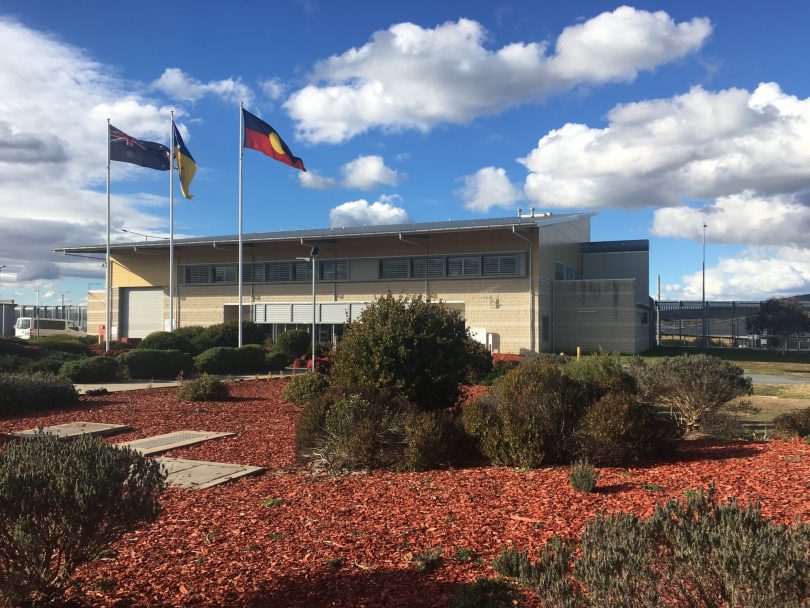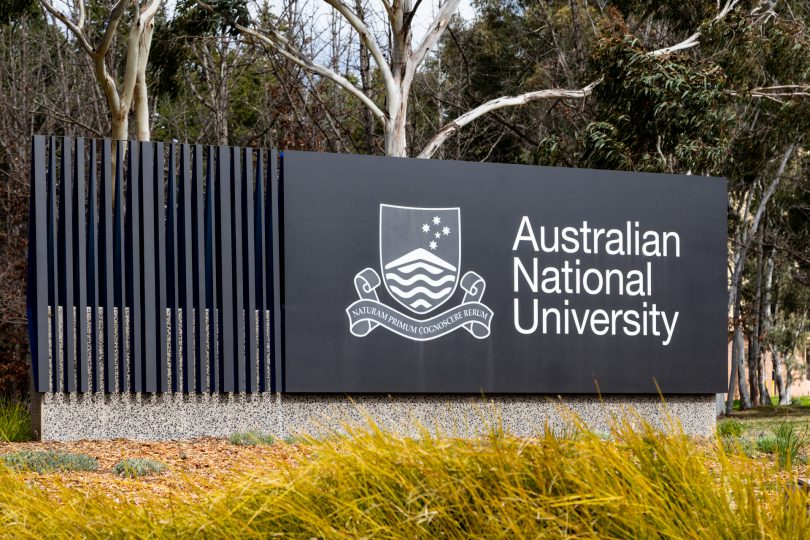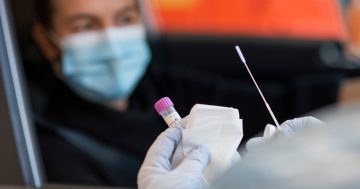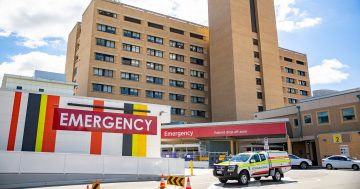
Multiple intrusions of the virus were detected in the prison throughout the Delta outbreak. Photo: File.
UPDATED 1:20 pm: The ACT has recorded six new cases of COVID-19 in the 24 hours to 8 pm yesterday.
Meanwhile, a new rapid-antigen testing program has begun at the Alexander Maconochie Centre (AMC).
Locally, a total of 3040 negative COVID-19 tests were received in the 24 hours to 9 am today; there are currently 144 active cases in the ACT.
Of the Territory’s 12-plus population, 97.8 per cent are now fully vaccinated.
There are a total of eight active and cleared cases in ACT hospitals as of 8 pm yesterday, including four in intensive care and four on ventilators.
Minister for Corrections Mick Gentleman today announced a rapid antigen screening pilot program at the Alexander Maconochie Centre, which he said will better protect employees, detainees and their families from COVID-19.
All staff, contractors and visitors over the age of 12 are now be required to undergo a rapid antigen test before entering the facility.
This test is be required irrespective of vaccination status.

Minister for Corrections Mick Gentleman announced all visitors, staff and contractors to the Alexander Maconochie Centre will now be required to undergo a rapid antigen test. Photo: Dominic Giannini.
Anyone who returns a positive result will not be able to enter the facility, while anyone who is unwell is asked not to attend.
It’s hoped the program will detect the virus in asymptomatic people and reduce the risk of outbreaks in the prison.
Staff will undergo training in the correct use of the nasal swab and the interpretation of the results, the Minister said.
Mr Gentleman described it as “another string in the bow against the spread of the virus in the AMC”.
The ACT Government decided not to go ahead with a similar screening program in schools this year, citing the impracticality of running such a complex scheme with only a few weeks of the school year left.
Chief Health Officer Dr Kerryn Coleman said there were also some logistical challenges to work through, including the need for young children to be nasally swabbed every morning.
A number of COVID-19 cases have been recorded at the facility throughout the Territory’s Delta outbreak, including a “reasonably senior staff member” who tested positive in late September after working at the jail for multiple days.
However, over the border in NSW, a COVID-19 outbreak at a private prison in Sydney spiralled out of control.
Over the course of the outbreak from July to November, more than 500 inmates and 75 staff tested positive for the virus.
Meanwhile, Caroline Chisholm School (Junior Campus) has now been listed as an exposure location for two days – Thursday, 25 November and Friday, 26 November.
In a letter sent to parents, carers and staff yesterday (29 November), the school confirmed that the affected cohort of students was in the Learning Support Unit and Preschool (Rosellas). These students must now stay at home, but all other cohorts can return to school.
Anyone required to quarantine will be contacted directly by ACT Health with instructions to follow.
Today in NSW, there are 179 new cases and three deaths.
Another case of the Omricon variant of concern has also been identified in NSW, bringing the state’s total to five.
There are 160 people in hospitals across the state with the virus and 26 in ICU.
NSW Health said 94.5 per cent of the 16-plus population has received their first dose, and 92.4 per cent has had two doses.
In Victoria, there are 918 new cases and six deaths.
There are 305 Victorians hospitalised with COVID-19, and 91 per cent of the state’s eligible population (12 and over) is fully vaccinated.
More to come.

International students and temporary visa holders will now be locked out of the country until at least 15 December. Photo: Michelle Kroll.
9:30 am: International students and temporary visa holders will be barred from entering the country after the Federal Government postponed reopening the border for at least two weeks due to uncertainty around the COVID-19 Omicron variant.
The National Security Committee of cabinet met late last night to discuss the reopening, which was scheduled for tomorrow (1 December).
A statement from Prime Minister Scott Morrison’s office released late last night (29 November) attributed the decision to medical advice provided by Chief Health Officer Professor Paul Kelly.
“The temporary pause will ensure Australia can gather the information we need to better understand the Omicron variant, including the efficacy of the vaccine, the range of illness, including if it may generate more mild symptoms and the level of transmission,” the statement read.
Five cases of the new Omicron variant have already been detected in returned travellers in Australia.
Group of Eight Chief Executive Vicki Thomson – which represents the country’s major universities – told the ABC this morning that the “unfortunate yet understandable” decision had, in fact, been made in the best interest of international students.
She’s hopeful students will still be able to enter Australia before the first semester of 2022.
Under the proposed reopening scheme, only fully vaccinated international students, migrants and humanitarian visa holders would have been allowed to enter the country.
Travellers from Japan and the Republic of Korea, who were also meant to be allowed to enter Australia, will also be locked out for another fortnight.
Due to the pandemic, some of these groups have been locked out of the country for almost two years.
It has also meant anyone currently residing in Australia on a temporary visa has been effectively unable to leave if they intended to return.
As of Saturday (27 November), anyone who has arrived in Australia from South Africa, Namibia, Zimbabwe, Botswana, Lesotho, Eswatini, Malawi and Mozambique must enter 14-days of supervised quarantine subject to the arrangements of each jurisdiction.
Non-citizens and permanent residents who have not yet entered the country, and have visited one of the affected countries, will be barred from doing so.
Citizens and permanent residents are also subject to quarantine requirements.
A National Cabinet meeting has been called today to coordinate the response of state and territory leaders to what the World Health Organisation (WHO) has labelled a “variant of concern”.
There are now four cases of the Omicron variant in NSW and one in the Howard Springs quarantine facility in the Northern Territory.
Little information is known about the transmissibility of the new variant, or its severity. It’s also unclear how much protection the current vaccines provide against Omicron.
Chief Minister Andrew Barr yesterday urged caution but said people should remain calm. The ACT will pause easing restrictions, such as scrapping QR code check-ins and removing all density limits, until more is known about the virus.
The WHO has decried many countries’ responses to the new variant. They say slamming borders shut may slow the spread of Omicron, but it won’t stop it.
Furthermore, it says closing borders is a punitive measure and will discourage countries from reporting new strains of the virus as they emerge.
“With the Omicron variant now detected in several regions of the world, putting in place travel bans that target Africa attacks global solidarity,” WHO regional director Matshidiso Moeti said.
The South Africa doctor who discovered the variant has warned no one in the world will be safe until Africa is vaccinated.
More to come.
















